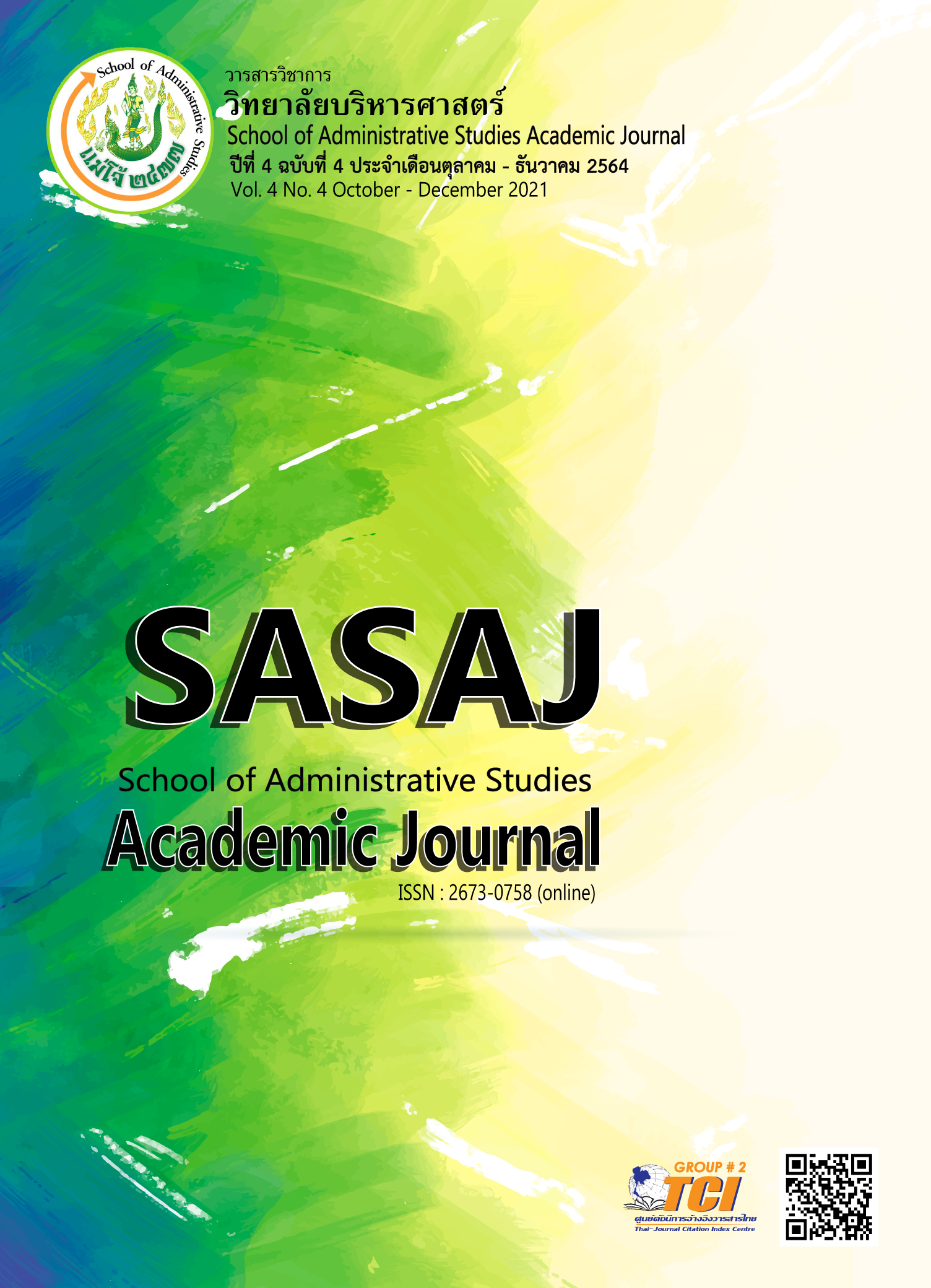การขับเคลื่อนนโยบายการพัฒนาทรัพยากรมนุษย์ผ่านสื่อบันเทิงของสาธารณรัฐเกาหลี
Main Article Content
บทคัดย่อ
สื่อบันเทิงนับได้ว่าเป็นหนึ่งในเครื่องมือสำคัญที่สามารถใช้ในการชี้นำสังคมตามนโยบายสาธารณะด้านต่างๆ ของประเทศ โดยเน้นไปที่การมุ่งปรับพฤติกรรมของประชาชน บทความวิชาการนี้ให้ความสนใจกับนโยบายการพัฒนาทรัพยากรมนุษย์ของประเทศสาธารณรัฐเกาหลีทั้งในส่วนของปัจจัยที่เป็นตัวเร่งให้เกิดการพัฒนา แนวทางการปฏิบัติรวมถึงการเรียนรู้ในลักษณะต่าง ๆ โดยบทความนี้มีวัตถุประสงค์เพื่อศึกษาแนวทางการขับเคลื่อนนโยบายการพัฒนาทรัพยากรมนุษย์ผ่านสื่อบันเทิงของสาธารณรัฐเกาหลีผ่านสื่อบันเทิง ได้แก่ ละครเกาหลีจำนวนสามเรื่องประกอบด้วย Crash Landing on You, Start-up, และ Dr. Romantic ที่ส่งผลต่อการปรับเปลี่ยนพฤติกรรมของประชาชนในประเทศทั้งทางด้านทัศนคติที่มีต่อการสร้างสันติภาพ ในคาบสมุทรเกาหลีการเสริมสร้างต่อยอดองค์ความรู้ผ่านกระบวนการแฮกกาธอน และการพัฒนาทักษะวิชาชีพศัลยแพทย์ในฐานะอาจารย์และนักศึกษา อันสอดคล้องกับลักษณะการเรียนรู้ของ เบนจามิน บลูม จากผลการศึกษาพบว่า สื่อบันเทิงทั้งสามเรื่องให้ความสำคัญกับประเด็นการพัฒนาทรัพยากรมนุษย์ที่แตกต่างกันออกไป โดยเรื่องCrash Landing on You มีความสอดคล้องกับการเรียนรู้ด้านจิตพิสัย เรื่อง Start-up เป็นไปตามลักษณะการเรียนรู้ ด้านพุทธพิสัย และเรื่อง Dr. Romantic มีเรื่องราวการถ่ายทอดที่สอดคล้องกับการเรียนรู้ ด้านทักษะพิสัยซึ่งทั้งหมดนี้สามารถสรุปเป็นข้อเสนอแนะอันเกี่ยวข้องกับปัจจัยที่ส่งผลต่อความสำเร็จในการขับเคลื่อนนโยบายการพัฒนาทรัพยากรมนุษย์ผ่านสื่อบันเทิงของสาธารณรัฐเกาหลีอีกด้วย
Article Details
ลิขสิทธิ์
เอกสารอ้างอิง
ไชยวัฒน์ ค้ำชู. (2561). เบื้องหลังสนธิสัญญาสันติภาพเกาหลีเหนือ-ใต้. สืบค้นจาก https://www.chula.ac.th/cuinside/7917/
บีบีซี. (2561). ประชุมสุดยอดสองเกาหลี- เปรียบเทียบข้อตกลงปี 2018 กับปี 2007. สืบค้นจาก https://www.bbc.com/thai/international-43928638
Anwar, R., Rehman, M., Wang, K. S., Hashmani, M. A., & Shamim, A. (2019). Investigation of Knowledge Sharing Behavior in Global Software Development Organizations Using Social Cognitive Theory. IEEE Access, 7, 71286-71298. https://doi.org/10.1109/ACCESS.2019.2912657
Armstrong, M. (2006). A handbook of human resource management practice. London: Kogan Page Limited.
Ayhan, K. J. (2020). Transferring knowledge to narrative worlds: applying power taxonomy to science fiction films. International Studies Perspectives, 21(3), 258-274.
Bloom, B. S., Engelhart, M. D., Furst, E. J., Hill, W. H., & Krathwohl, D. R. (1956). Taxonomy of educational objectives: the classification of educational goals. New York: David McKay.
Bok-rae, K. (2015). Past, present and future of Hallyu (Korean Wave). American International Journal of Contemporary Research, 5(5), 154-160.
Briscoe, G., & Mulligan, C. (2014). Digital innovation: the Hackathon phenomenon. Retrieved from https://qmro.qmul.ac.uk/xmlui/bitstream/handle/123456789/11418/Briscoe%20Digital%20Innovation:%20The%20Hackathon%20Phenomenon%202014%20Published.pdf?sequence=2
Cheon, B. Y. (2014). Skills development strategies and the high road to development in the Republic of Korea. In Salazar-Xirinachs, J. M., Nübler, I., & Kozul-Wright, R. (Eds.), Transforming Economies (pp. 213-238). Geneva: International Labour Office.
Coccia, M. (2018). Disruptive firms and industrial change. Journal of Economic and Social Thought, 4(4), 437-450.
Delgado, R. I., Murdock, S., & Gammon, E. (2018). A model for healthcare administration education to meet needs of disruptive change in healthcare. The Journal of Health Administration Education, 35(4), 491-504.
Frey, F. J., & Luks, M. (2016). The innovation-driven hackathon: one means for accelerating innovation. The 21st European Conference on Pattern Languages of Programs, 1-11. https://doi.org/10.1145/3011784.3011794
He-rim, J. (2019). ‘Korea may have to import surgeons in the future’. Retrieved from http://www.koreaherald.com/ view.php?ud=20190111000479
Hong, A. (2019). Global entrepreneurs gather in Seoul to 'hack' for a greater Korea. Retrieved from https://www.korea.net/NewsFocus/HonoraryReporters/view?articleId=174439
Hoque, M. E. (2016). Three domains of learning- cognitive, affective and psychomotor. The Journal of EFL Education and Research, 2(2), 45-52.
Jervis, R., & Rapp-Hooper, M. (2018). Perception and Misperception on the Korean Peninsula. Foreign Affairs, 97(3), 103-117.
Jung, E. Y. (2009). Transnational Korea: a critical assessment of the Korean wave in Asia and the United States. Southeast Review of Asian Studies, 31, 69-80.
Kang, S., Jo, H. S., Boo, Y. J., Lee, J. S., & Kim, C. S. (2015). Occupational stress and related factors among surgical residents in Korea. Annals of surgical treatment and research, 89(5), 268-274. https://doi.org/10.4174/astr.2015.89.5.268
London School of Management Education. (2019). The three (3) domains of learning – cognitive; affective; and psychomotor (caps) – it’s application in teaching and learning. Retrieved from https://lsme.ac.uk/blog/the-three-3-domains-of-learning
Mazarr, M. J., Gentile, G., Madden, D., Pettyjohn, S. L., & Crane, Y. K. (2018). The Korean peninsula: Three dangerous scenarios. California: Rand Corporation.
McKinsey Global Institute. (2021). The future of work after COVID-19 (Executive Summary). Retrieved from https://www.mckinsey.com/featured-insights/future-of-work/the-future-of-work-after-covid-19
Ministry of Personnel Management. (2021). Human resource development. Retrieved from http://www.mpm.go.kr/english/ system/humanResource/
Moyer-Gusé, E. (2008). Toward a theory of entertainment persuasion: explaining the persuasive effects of entertainment-education messages. Communication Theory, 18(3), 407-425.
Nolte, A., Pe-Than, E. P. P., Filippova, A., Bird, C., Scallen, S., & Herbsleb, J. D. (2018). You Hacked and Now What? - Exploring Outcomes of a Corporate Hackathon. Proc. ACM Hum.-Comput. Interact., 2(CSCW), Article 129. https://doi.org/10.1145/3274398
Parc, J. & Hwy-Chang, M. (2013). Korean dramas and films: key factors for their international competitiveness. Asian Journal of Social Science, 41, 126-149.
Porter, M. E. (1990). The competitive advantage of nations. Retrieved from https://hbr.org/1990/03/the-competitive-advantage-of-nations
Sharad, K. (2021). 'Crash Landing on You' explores the painful separation of the two Koreas. Retrieved from https://studybreaks.com/tvfilm/crash-landing-on-you/
Shu, C. (2014). Global Hackathon Seoul will be the first event of its kind sponsored by the city’s government. Retrieved from https://techcrunch.com/2014/12/15/global-hackathon-seoul/
Song, S. Y. (2020). ‘Why are medical school students reluctant to become surgeons?’. Retrieved from https://www.koreabiomed.com/news/articleView.html?idxno=9161
Tamondong, H. (2020). Why Netflix's K-drama 'Start-Up' is worth watching. Retrieved from https://www.cosmo.ph/entertainment/ why-should-you-watch-the-k-drama-start-up-a4575-20201115-lfrm
Valieva, J. (2018). Cultural soft power of Korea. Journal of History Culture and Art Research, 7(4), 207-212.
Venkataraman, S. (2020). 'Romantic Doctor, Teacher Kim’…A gripping medical drama, that puts forward some pretty compelling arguments on what it really means to be a doctor. Retrieved from https://medium.com/the-broken-refrigerator/romantic-doctor-teacher-kim-a-gripping-medical-drama-that-puts-forward-some-pretty-compelling-1ebfcbf074b1
Vlados, C. M. (2019). Porter's Diamond approaches and the competitiveness web. International Journal of Business Administration, 10(5), 33-52.
World Economic Forum. (2020). The future of jobs report 2020. Retrieved from https://www.weforum.org/reports/the-future-of-jobs-report-2020


